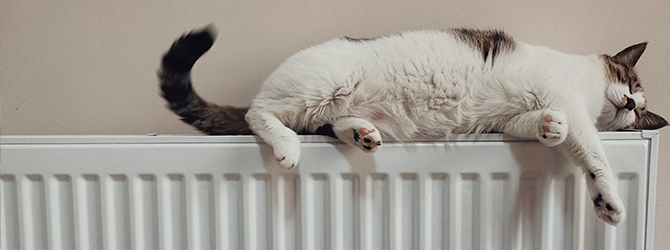Hip dysplasia in cats: causes, symptoms and prevention
First Published: 27/03/2020
Last Updated: 08/02/2023
Hip dysplasia is comparatively rare in cats but it does occur, particularly in larger cats such as the Maine Coon.
Have you noticed that your cat is limping or reluctant to move?
It could be a sign of hip dysplasia…
What is hip dysplasia?
Hip dysplasia occurs when the hip joints fail to develop properly.
The hip joint effectively consists of a ball and socket, otherwise known as the femoral head and the acetabulum.
In cases of hip dysplasia, the femoral head develops abnormally so that it doesn’t properly fit the socket. This causes pain and discomfort, and the longer the condition is left alone without treatment, the worse it gets. Hip dysplasia can often lead to arthritis in cats.
What causes it?
Hip dysplasia is rarer in cats than in dogs, but it’s also harder to spot in cats because they’re more skilled at disguising their pain and discomfort.
Although hip dysplasia is believed to be a hereditary condition, certain environmental factors like weight and nutrition can make cats more vulnerable to it. If a cat is heavier, their joints will be supporting extra weight, which makes deformation more likely. This is why naturally large-sized cats such as Maine Coons are more susceptible than smaller breeds.

Spotting the signs of hip dysplasia in cats
Because cats are so skilled at hiding their pain or discomfort, hip dysplasia may be quite severe by the time symptoms start to show.
Signs of hip dysplasia include:
- Reluctance to move, particularly to jump
- A noticeable lack of muscle in the hind legs
- Lethargy and general irritability
- Walking like they’re unbalanced on their hindlimbs
If your cat displays any of the signs listed above, contact your vet right away.
Treatment
Treatment will depend on how serious the condition is. In minor cases, medication and nutritional supplements may suffice. In more advanced cases, surgery may be required.
Your vet will examine your cat thoroughly and decide upon a course of treatment that’s best suited to them and their condition.
Need more info?
For more help and advice on hip dysplasia, arthritis in cats or any other aspect of your cat’s welfare, have a chat with your local vet.
Find your nearest vet using our Find a Vet page, or speak to a vet online using Online Vets.


